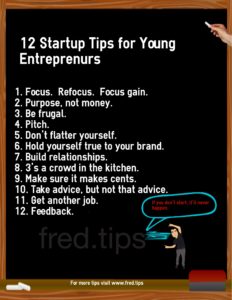This is a continuation of my series on young entrepreneurs. If you haven’t read Part 1, click here: Where to start as a young entrepreneur – Part 1

Founding a startup as a young entrepreneur gets difficult if you don’t know where you are going. This guide will help you get started.
In the last week, I have had several people ask me for a list of requirements that I felt were important. I complied a list, and here it is in no particular order:
When building your entrepreneur empire, your thoughts are always to jump at every opportunity that comes your way. Every opportunity you hear about, you see dollar signs. Don’t let false hope and false dollar signs derail you from your business goal. The more time you spend investigating each opportunity, the more time you have to spend to get the train back on track, the more time you lost focusing on your business. Do one thing and do it well. Its better to be 100% proficient on one thing vs. being 10% proficient on 10 things. Most failed startups are the direct result of spreading too thin and being greedy when it comes to opportunities.
2. Purpose, not money.
3. Be frugal.
Remember that $600 chair you saw at Office Depot? With the lumbar support and mesh backing so you don’t sweat on a hot summer day… Yeah, that one. DON’T BUY IT! You don’t need office space, you don’t need a brand new laptop, you don’t need a fancy chair. All of the above can be accomplished at a Starbucks with a pair of earphones. You want your cash to be in your account for as long as possible. Watch every dollar and triple check every expense. Will this expense help your business get to the next level? If the answer is maybe, the answer is no.
4. Pitch.
Sometimes known as an “elevator pitch” – logic: If you were an entrepreneur in an elevator, and a high level CEO walks in, you have until he gets off the elevator to convince him/her to purchase your product or to convert to your services. What would you tell him/her? You have about 25-30 seconds to give them your pitch and convince them that you are IT! Work on this, practice this, try it in front of a mirror, work on it some more. Yours took 31 seconds? That took too long. Work again.
I have looked around for some time and found this website to be the most detailed with helping examples to help put your entrepreneur pitch together: Creating an Elevator Pitch
5. Don’t flatter yourself.
Make sure you can deliver what you promise. Don’t fall victim to your own false promises. Don’t exaggerate the truth or your previous accomplishments. There is always a way for people to find out. More times than not, they find out and your reputation goes down the drain. Your reputation is so much more important than the cash in your wallet. Guard it with everything you have!
6. Hold yourself true to your brand.
Remember the old commercial for FedEx? Absolutely, positively by 11am. 11:01am would be unacceptable. Whatever you promise, you have to work day and night to make sure you deliver on time. Your brand reputation is riding on your ability to make promises and deliver promises.

7. Build relationships.
You have to do the foot work. Sitting behind your Social media persona and posting about how wonderful you are will only get you so far. If you want people to buy your product, or buy into your services you need to go to them and preach to them. The more relationships you build, the more people you have out there who are vouching for you. The more people who vouch for you, the more opportunities will arise from your relationships. The trick here is to build your network of relationships before you actually need it.
You can read more on building relationships here: Secrets to Business Relationships
8. 3’s a crowd in the kitchen.
A lot of entrepreneur sites recommend finding a co-founder to start a business with. There are many benefits to this theory including splitting responsibilities and costs. With 2 or 3 of you, it is easier to grow and reach more people in less time. My rule of thumb is that if you have 3 cooks in the kitchen, somewhere, sometime, the food isn’t going to be perfect. Also, remember $100 profit, split into 3 pockets is $33 per person.
9. Make sure it makes cents.
I spoke to someone this morning who spent $300 a month marketing his brand on Facebook. He has a small business in Pasadena, Ca; he budgeted $300 / month using Facebook ads. The problem? He marketed his company to a nationwide audience.
He has a small family owned coffee shop. Why would anyone drive from Washington to drink coffee in Pasadena? What if you are driving through town? Then your radius marketing of 5 miles will nail them! Free advertising from yelp! is more valuable in this case than $300 a month from Facebook. Make sure you know where you are spending your money and what the return on your money is. If you spend $300 a month on advertising, how many cups of coffee do you need to sell to break even? Is your goal to break even or just bring people in the doors and hope they become lifelong friends?
10. Take advice, but not that advice.
The old saying “Are you the smartest guy in the room? If so, you are in the wrong room” comes true again. While you are new, you have to surround yourself with people who have been there and done that before. You need people to give you advice, to bounce ideas off of, to help proofread information, to help plan next step goals, etc. You need people. As you start to get better, you will realize that the more you do, the more success you find, the more people line up to give you free advice. I like to listen to all advice because I never know what I’m going to love. I take everything with a grain of salt and perform my own analysis on the advice. Sometimes, it’s brilliant! Other times, it’s trash! My brain does the processing, but my gut is what leads me.
11. Get another job.
Welcome to entrepreneurship! As a young entrepreneur you should sit back, relax, and wait for the money to come rolling in! WRONG! You have expenses… business expenses, personal expenses, etc. The money has to come from somewhere to help ends meet until your startup matures. You need a job to help pay for your startup. I’m not telling you to go work somewhere just to waste some time and bring home a paycheck. I want you to strategically go work somewhere that will help your startup grow:
1. Learn how others are marketing in your industry.
2. Learn how much they charge.
3. Learn how they maintain relationships.
4. Learn what types of relationships they abandon.
The downside: Make sure you don’t get so focused on your job that you forget to focus on your business. You need to find a happy balance between the two for this to work. At the end of the day, you are making a honest wage and must pull your weight to keep your job.
12. Feedback.
The customer is NOT always right, and neither are you! I recently had one of my top 5 clients decide to leave us and join a partnership with another IT company who was open 24/7/365. In my last call with them, we went over all the access passwords and server locations.
In order to turn a negative into a positive, I asked them to send me a list of things that they felt we fell short on. The immediate response I received was that they didn’t want to throw mud back and forth between us. I lost my cool a little bit and replied with a harsh “I understand, but I would love to know what ways I can take care of my existing clients better” – the next morning, I had a list of 12 things they felt we could have done better in our time together. Some of them were absurd, but others were so on point that we changed our internal procedure the very next day. Sometimes feedback is brutal, but it’s the only way to get better.
Want more tips? How about 6 tools every entrepreneur should use in their business?

Please note: I reserve the right to delete comments that are offensive or off-topic.